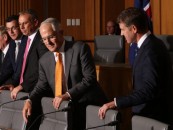When I released a video containing my National Apology to Taxpayers this week, the indignation it caused in some quarters was entirely predictable.
It always amuses me when people claim something I have said or done is “inappropriate” or politically incorrect. Elected members of Parliament should be no different from the people they represent. And I simply do not believe people are so easily offended.
But many people are intimidated by the culture of political correctness, imposed by those who view themselves as our superiors.
John Stuart Mill famously spoke of two types of constraints on freedom. The first is the obvious one, when the state censors by implementing laws against speech. The second is less obvious, but Mill believed it to be just as dangerous.
“There needs protection also against the tyranny of the prevailing opinion and feeling,” Mill argued, “against the tendency of society to impose, by other means than civil penalties, its own ideas and practices as rules of conduct on those who dissent.”
Section 18C of the Racial Discrimination Act is an example of Mill’s first kind of constraint. It makes it unlawful to “offend, insult, humiliate or intimidate” someone because of “race, colour or national or ethnic origin”.
Whether anyone is indeed offended, insulted or humiliated is up to the receiver of the message, not its source. Given an inability to know in advance how the recipient may feel, the only option is to avoid saying anything much at all.
I suspect S18C means an Australian Charlie Hebdo would be litigated to death. Despite 18C only referring to race, colour, or national or ethnic origin, Tony Abbott’s justification for backing down on repeal was to preserve “national unity” with Australia’s Muslim community. This conflates religion with race in the crudest possible way.
Such conflation is what leads to the coining of nonsensical terms like “Islamophobia”. Islam is an idea, neither racial nor national in origin. As such, like Christianity, it is something that should be debated freely, without one side of the debate being labelled with a “phobia”.
What goes by the anodyne name “political correctness” is an example of Mill’s second sort of constraint on speech, and it has significant consequences for the way we speak. Filmmakers, cartoonists, artists, authors and journalists are reluctant to tackle certain subjects – such as the life of Muhammad – because individuals or groups claim to be offended.
There is now a long list of people who have been harassed and sacked for their views. They haven’t broken any law; they have simply been howled down and hounded.
It is absurd that we can tell a joke about an Irishman, Englishman and Scotsman in a bar but cause a ruckus (and potentially risk prosecution) if the same joke is told about an Aborigine, Asian and a Muslim. We can risk telling jokes about blondes, but we’re reprehensible sexists if we tell the same joke about women in general. If our employer is “politically correct”, it might even cost us our job.
This is not consistent with a free society. It is also deeply unpopular with many Australians, and apparently with many Americans, too. Donald Trump makes a point of showing the extent to which he does not care about political correctness, with a significant chunk of his support coming from that characteristic alone.
What is wrong about the whole idea of regulating feelings is that different things upset different people. It’s subjective. Although feelings can be influenced by external factors, ultimately they are a matter of personal choice. No matter how ill-informed or obnoxious the words, our reaction to someone else’s words is always up to us.
Unless words are coercive – threatening, misleading, or forcing us to do something against our will – we are solely responsible for how they are received. Obliging other people to share in our chosen feelings of offence is petty and trivial.
Politicians and other public figures ought to be judged robustly on their policies and honesty in public life. Arguments should be assessed on merit, not on who makes them or whether the words prompt someone to take offence. Nobody – prince, politician or pauper – should be judged for engaging in peaceful (even if vigorous) political debate.
We need more “inappropriate” speech in public life, not less.
David Leyonhjelm is a senator for the Liberal Democrats.







